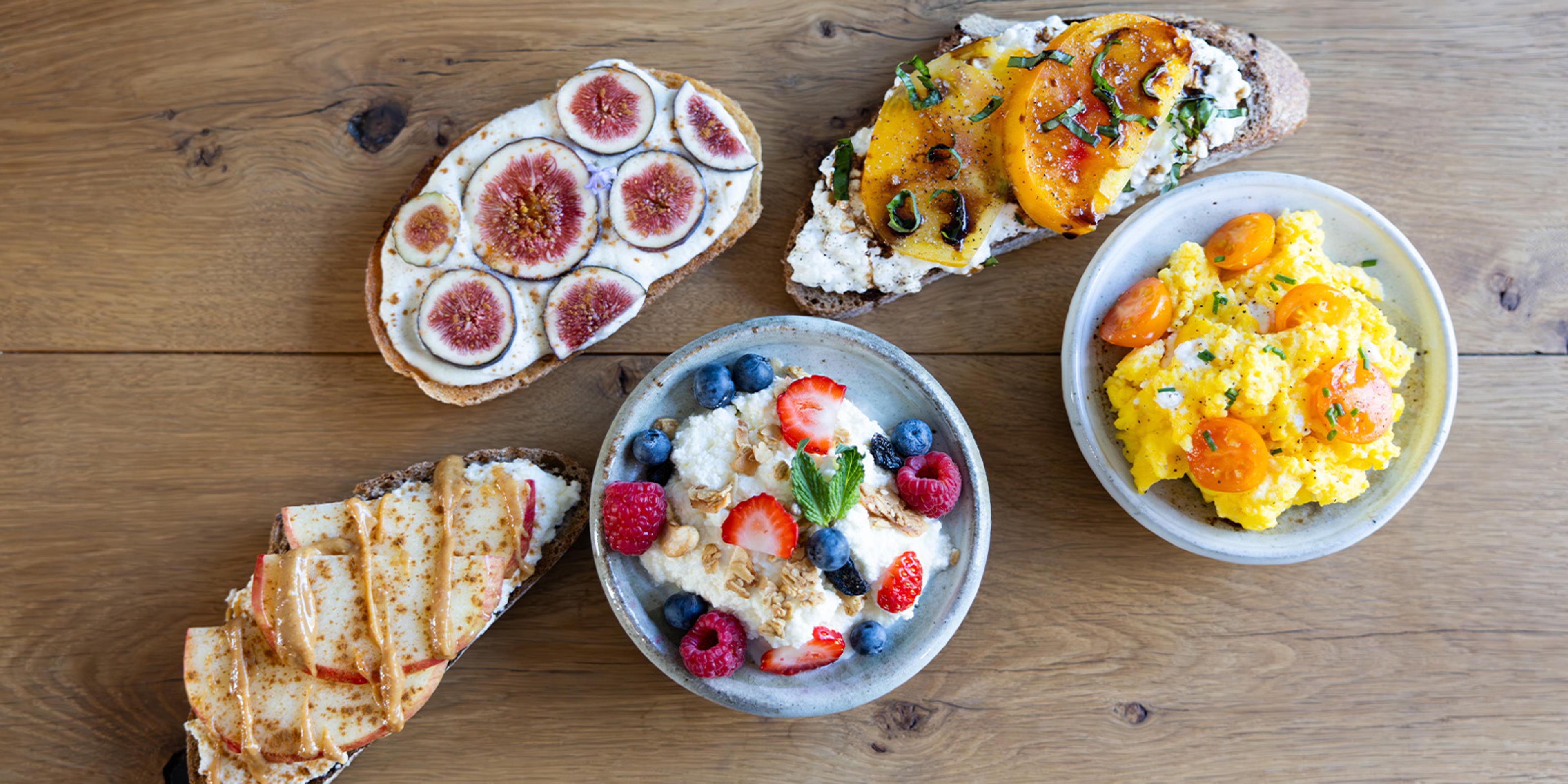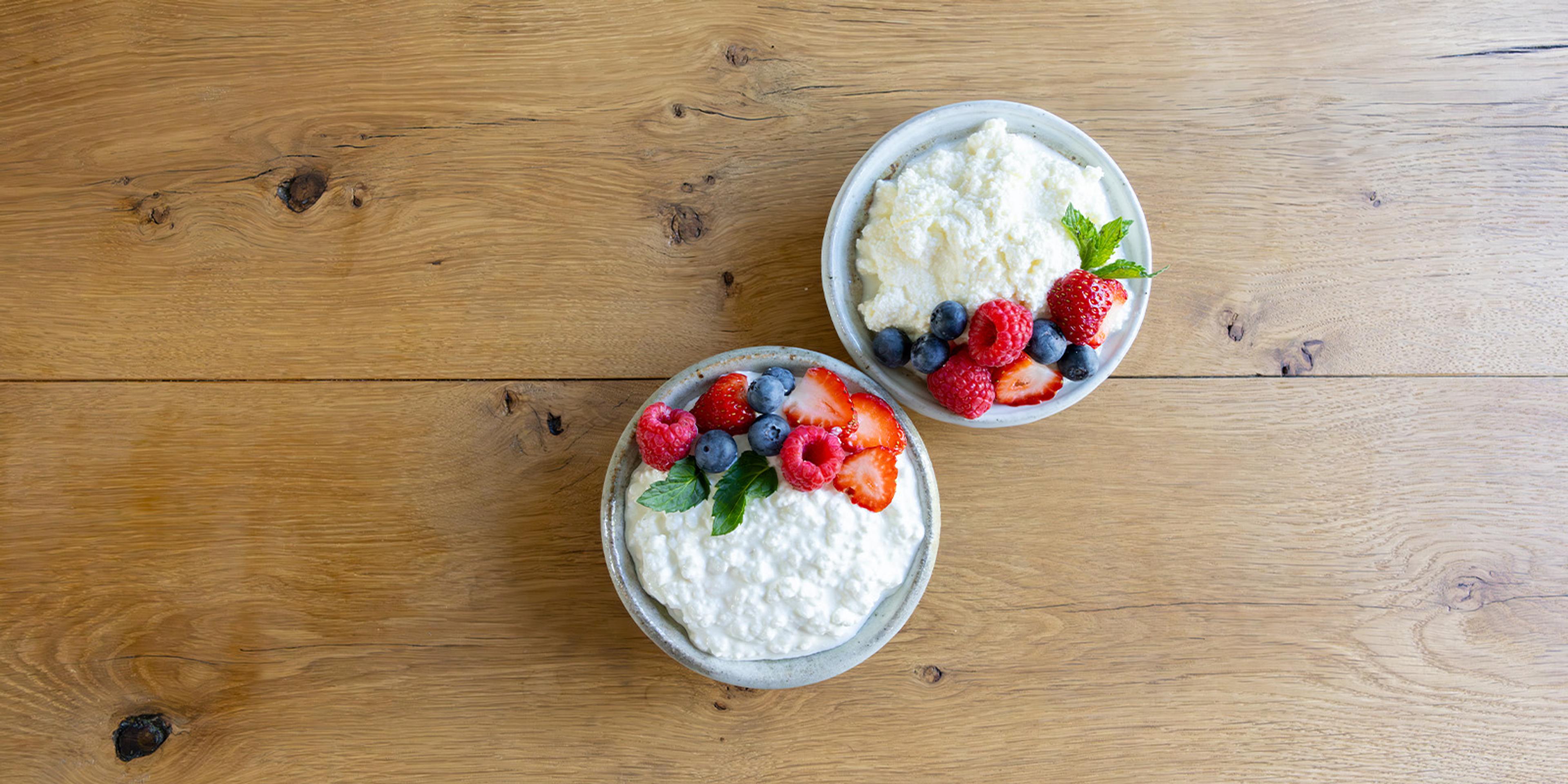
Food
Is Ricotta Cheese or Cottage Cheese Healthier?
When it comes to making health-conscious choices, many people compare dairy products, thanks to the plethora of nutrients they provide. Cottage cheese and ricotta cheese are two popular options often debated among enthusiasts of nutritious and balanced diets. Both cheeses have unique textures, flavors and nutritional profiles that cater to diverse tastes and dietary needs.
Understanding their differences involves examining ingredients, production methods and potential health benefits to determine what aligns with your specific dietary goals or preferences.
Cottage cheese and ricotta cheese are high-protein, relatively low-calorie cheeses that have gained exponential popularity. Compared to many cheeses, these soft cheeses have a mild taste that can be described as slightly tangy (cottage cheese) or slightly sweet (ricotta). The best part is that both cheeses contain unique nutritional profiles that set them apart. But since both are appealing, you may be asking yourself what is healthier, cottage cheese or ricotta?
Cottage cheese and ricotta are finally having their day in the sun!
What's the Difference Between Cottage Cheese and Ricotta?
Ricotta and cottage cheese are soft cheeses that have a curd-like texture. However, ricotta and cottage cheese production start along different stops in the dairy production process.
Ricotta is made with added acid (typically acetic acid — vinegar), while acids in cottage cheese are created in the production process.
Organic Valley® Cottage Cheese and Organic Valley® Ricotta Cheese are made using milk. Other companies commonly make ricotta using whey (the liquid remnants of the curdling and straining process of making cheese, often mozzarella cheese).
The curdling process of these cheeses gives defined, unique textures that go great in a variety of dishes. Cottage cheese, due to the presence of lactic or other acids, can be described as "lumpy." On the other hand, ricotta has a grain-like texture that's more easily spreadable.
Ricotta cheese is naturally slightly sweeter than cottage cheese. Additionally, ricotta cheese does not undergo fermentation, while Organic Valley Cottage Cheese does.
Many people love cottage cheese because of its tanginess. Ricotta cheeses, on the other hand, can be used both as a savory spread and a dessert addition. But feel free to experiment. Both are versatile complements to many dishes and snacks.

Whipped Organic Valley® Ricotta Cheese on sourdough toast with fig and honey.
Health Benefits of Ricotta
Ricotta cheese, although often overlooked when choosing a soft cheese, is a densely nutritious and highly versatile food. Here are some health benefits you may reap if you add ricotta to your diet regularly.
Could Provide Heart Health Benefits
Because of traditional production methods, ricotta cheese tends to have less sodium than cottage cheese (and many other types of cheese on the market). Sodium is a known culprit of cardiovascular disease, which may lead to dangerous health outcomes such as high blood pressure (hypertension), heart attack or stroke.
The American Health Association recommends that the average healthy adult eat no more than 2,300 milligrams of sodium per day. Ricotta cheese may be a good substitute for other soft cheeses that are heavily salted, such as cream cheese, feta or blue cheese.
May Support Bone Health
The USDA’s Dietary Guidelines for Americans recommend that the average, healthy woman between the ages of 19 and 50 consume about 1,000 milligrams of calcium daily. This number grows for those over the age of 50 due to greater chances of developing osteoporosis.
Just a quarter cup of ricotta cheese provides 150 milligrams of calcium or about 15% of your daily value. Most Americans are consuming far from enough calcium, and as ricotta is a calcium-dense cheese, incorporating this food into your diet regularly may ward off some pretty serious consequences of calcium deficiency such as bone loss.
Contains Frequently Overlooked Nutrients
Besides calcium, ricotta cheese contains a plethora of commonly ignored nutrients. A quarter cup of Organic Valley Ricotta Cheese contains 60 milligrams of potassium, or 2% DV. Potassium is an essential nutrient that not only supports heart health but also regulates muscle function, nerve function and fluids in the body.
Additionally, half a cup of ricotta contains magnesium. Magnesium is also essential for heart, bone and nerve health — not to mention magnesium’s role in muscle function.
Potassium and magnesium are essential to the DASH Diet, a dietary pattern created to support healthy blood pressure.

Cottage cheese or ricotta cheese can be used to make delightful, scrambled eggs.
Simple Ways to Add Ricotta Cheese to Your Diet
Although ricotta cheese is often found in traditional Italian desserts such as cannoli, ricotta cheese can go with just about any meal of the day. Often seen melted over pastas or fresh out of the oven in baked goods, ricotta can be eaten raw. Raw ricotta can go great in smoothies (to give extra creaminess) or easily spread on toast or waffles for a nutrient punch.
Ricotta can be incorporated into your favorite lasagna or pasta dish (whether melted on top or stuffed in noodles), placed atop a salad or baked into your favorite veggies — including eggplant or zucchini. Ricotta is also a great protein-packed snack option — 6 grams per quarter cup — that can be used as a dip or atop a fruit bowl. You can also add ricotta to scrambled eggs for a serious protein boost. Simply beat a tablespoon of it into your eggs before you pour your mixture onto your pan to cook — it makes for a super creamy and rich dish.
Can You Eat Ricotta Raw?
Because of its versatile taste, ricotta can be eaten with just about anything. Wondering if you can eat raw ricotta? Ricotta cheese is available in two forms — raw and pasteurized.
Pasteurized ricotta cheese, including Organic Valley Ricotta, undergoes a heat treatment that kills harmful bacteria, making it safer to consume.
Organic Valley Whole Milk Ricotta Cheese is crafted from organic, non-homogenized, pasteurized milk that has been heated to a temperature of at least 161 F for at least 15 seconds (following legal pasteurization standards) to kill potentially harmful bacteria. It is also vegetarian-friendly and gluten-free.
The raw form of ricotta is made from unpasteurized milk, which can contain beneficial bacteria but also poses a risk of containing harmful pathogens such as listeria and salmonella. Consuming raw ricotta cheese requires careful handling and awareness of potential health risks, particularly for vulnerable populations such as pregnant women, the elderly and immunocompromised individuals.
Whether you can eat raw ricotta cheese is a question you should address with your healthcare provider.

Organic Valley® Ricotta Cheese on sourdough with apples, cinnamon, honey and peanut butter is a satisfying snack or meal.
Consuming ricotta made from unpasteurized milk or past its expiration date can pose health risks, especially for pregnant women, the elderly and individuals with weakened immune systems. This is due to the potential presence of bacteria like Listeria monocytogenes. As with any cheese, following storage instructions and food safety guidelines is important to mitigate these risks.
Health Benefits of Cottage Cheese
Protein is high on the list of cottage cheese’s nutritional benefits, and each serving of Organic Valley Cottage Cheese comes with 15 grams of pasture-raised protein.
Cottage cheese is also a nutritious soft cheese that, because of its accessibility and versatile flavor, can add some serious oomph to your daily nutrition regimen. Here are just some of the benefits of adding cottage cheese to your regular diet:
May Aid in Weight Loss
So which is better for weight loss, ricotta or cottage cheese?
Because of its high protein content and relatively low caloric profile, cottage cheese may help you lose weight. Eating behaviors emphasizing high protein are associated with improved satiety (or the feeling of being full) and, therefore, can lead to weight loss. Just half a cup of cottage cheese contains a whopping 14 grams of protein. With only 110 calories, Organic Valley Cottage Cheese is a healthy way to boost metabolic function and energy levels without added sugars.
Additionally, cottage cheese contains beneficial cultures such as acidophilus and bifidus. Incorporating live and active cultures — or probiotics — into your diet can increase your chances of having a diverse gut microbiome, which is associated with weight loss and overall health.

Organic Valley® Cottage Cheese on sourdough toast with heirloom tomatoes, salt, pepper, basic and balsamic vinegar makes for a delicious, easy snack.
May Support Bone Health and Healthy Pregnancy
Cottage cheese is another soft cheese that provides calcium, with half a cup of Organic Valley Lowfat Cottage Cheese containing 80 milligrams — or 6% — of the daily value. Calcium is essential for bone health, as are other nutrients found in cottage cheese, like magnesium.
Calcium is also critically important for those who are pregnant. Consuming adequate calcium levels is essential for proper fetal skeletal growth. Because pregnant people excrete more calcium in their urine and have increased bone turnover, they must consume more calcium. Cottage cheese can be a safe option for pregnant parents-to-be during all three trimesters.
May Support Brain Health
Cottage cheese contains a plethora of brain-supporting nutrients that are often overlooked because they're seldom listed on the nutrition label. Cottage cheese contains nutrients such as vitamin B12, folate, choline, selenium and riboflavin, all of which are essential for proper brain function and improved cognition.
Nutrients such as vitamins B-12 and B-6 (folate) are especially important for children, as they are needed for proper brain development. Adolescents, too, often don’t consume enough of these nutrients. The adolescent brain is fine-tuning its mechanics after it has largely finished growing, so these nutrients are more important than ever. Therefore, cottage cheese can and should be featured in family mealtimes so that everyone can get a bit of this nutrient action.
Easy Ways to Include Cottage Cheese In Your Diet
Cottage cheese is delicious raw with fruit, granola or honey — a cottage cheese parfait! As the benefits of cottage cheese are becoming more well-known, many people have begun experimenting with this versatile cheese, adding it to smoothies for added creaminess, atop salads and even in baked dishes such as lasagna or casseroles. You can also use it as a topping on toast or as an addition to a hot baked potato.
Like ricotta or other soft cheeses, cottage cheese is easily incorporated into baked, cooked and otherwise heated dishes. However, some recipes may call for the cottage cheese to be drained first to avoid making the recipe mushy or overly moist.
Check out Organic Valley’s take on cottage cheese ice cream and an easy cottage cheese wrap.

Organic Valley® Cottage Cheese, left, and Ricotta Cheese have distinct textures.
Bottom Line — Is Ricotta or Cottage Cheese Healthier?
Simply put, they both have health benefits. Whether you're more partial to cottage cheese or ricotta, you can rest assured that you'll receive serious health benefits without high caloric intake, aggressive sodium counts or egregious levels of saturated fat.
Cottage cheese and ricotta cheeses are nutrient-packed, flavorful and versatile. You can eat them at any meal and in a variety of dishes.
Finding a brand that's just right for you shouldn’t be hard. Organic Valley has your back. All products are USDA-certified organic. Since both cottage cheese and ricotta are packed with protein and calcium, you can't go wrong with choosing either of them. Both are pasture-raised treats that will enliven your meals.
Lauren Manaker is an award-winning registered dietitian and book author. After spending over 15 years working in health care and industry, she started a consulting business focusing on reproductive, pediatric and women’s health. Lauren resides in Charleston, South Carolina, with her husband and young daughter. In her spare time, she can be found enjoying an outdoor oyster roast in the cooler months, doing anything on the water in the warmer months, and practicing yoga year-round.
Related Articles
- Tags:
- organic nutrition,
- organic breakfast,
- snacktime
















